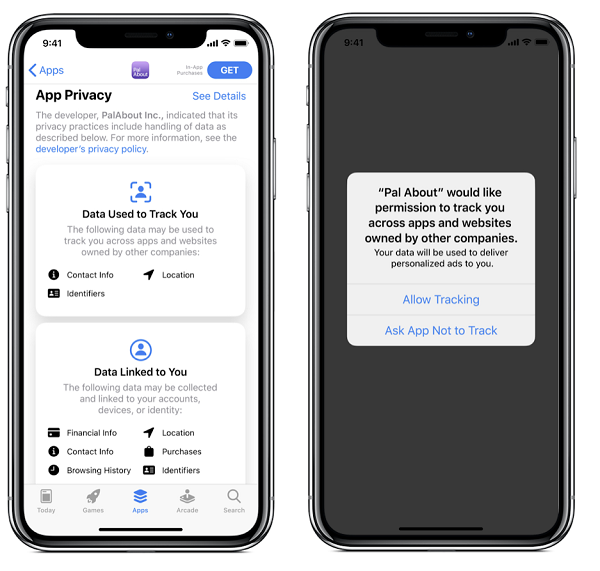Apple’s updated iOS 14 is coming soon and the impact on marketers could be dramatic but what exactly is all the fuss about? In this article, we’ll examine what the iOS 14 update could mean for your brand and how to prepare for the coming change.
Starting in early 2021, marketers will begin to see the impacts of iOS 14. Apple will begin requiring users to opt-in to allow apps access to their data. This forces companies to use per-app permissions to track customers “across Apps and Websites owned by other companies.” The language in this pop up seems to be designed to scare users from opting in and will definitely cripple cross-app data tracking in iOS. This new permission step will likely lead consumers to opt-out in order to “increase their data privacy” but this could come as a huge nuisance for marketers looking to leverage Facebook’s powerful algorithms to target with precision. The data provided by tracking pixels has been vital in order to achieve efficiency across paid channels over time and with less data, it’s likely marketers will lose some efficiency in their results. A recent update also forces apps to describe how the app will be using your data.

The Impact of iOS 14 for Facebook Marketers
For the past month or so, anyone using Facebook Ad Manager has been greeted by a persistent banner prompting users to start preparing for the impact of iOS 14 changes.
It’s impossible to know just how impactful these changes will be for Facebook Advertisers but in Facebook’s official statement they claimed that “our studies show, without personalized ads powered by their own data, small businesses could see a cut of over 60% of website sales from ads.”
Facebook’s statement is likely exaggerated to help in the ongoing PR battle with Apple, but even assuming it’s partially true, a 25% drop in company revenue can be very impactful. This could make some campaigns impossible to run profitably for brands. On the other hand, Facebook wins when they deliver efficient results for advertisers because this creates a feedback loop causing advertisers to spend more. So, if efficiency drops, it’s likely brands will pull back spending on Facebook which could be incredibly impactful for Facebook’s business, (for context In 2019, about 98.5 percent of Facebook’s global revenue was generated from advertising).
We saw similar things happen with the introduction of iOS 13. A similar permission prompt focused on geographic information was introduced, asking users about opting-in “with apps when they’re not in use”. These sharing rates plummeted according to Maurice Rahmey, co-founder of Disruptive Digital.
When Apple introduced it’s location tracking prompts in iOS 13, opt-in rates to share data with apps when they’re not in use dropped from close to 100% to often below 50%. (source: https://t.co/M49LIAcPgi) pic.twitter.com/4GWihY9dbF
— Maurice Rahmey (@mrahmey) December 17, 2020
In the US, about 60% of Americans use Apple products. If people being to decline the opt-in prompt by Facebook and other apps as they have in the past with ad tracking, advertisers could lose out on signal from about 65M people or about 30% of their US audience on non-FB apps and websites.
Allowing users to opt-out of tracking will disable the powerful Facebook tracking pixel and dramatically affect advertisers looking to optimize their campaigns for certain actions tracked by the Facebook Pixel. Any tracking for Add to Cart, Purchases, and other custom conversions will now be under-reported due to people opting out of tracking. This lack of tracking will also disrupt the Facebook Ad Manager’s ability to learn and optimize for users taking your intended actions. Additionally, Facebook will no longer be able to optimize around app installs or app events unless iOS users explicitly opt into tracking on both Facebook and the App in question.
The impact on retargeting audiences is still a little fuzzy but likely it will exclude anyone who visited your site from an iOS 14 device. Similarly in building audiences based on-site activity, the data will be less robust which will impact Facebook’s most powerful feature, Lookalike Audiences. Facebook interest targeting is notoriously inaccurate as is, but it’s likely that these interests will not be affected as much. Currently, Facebook already has these attributes on all users and will be able to continue updating these based on Facebook and Instagram behavior.
Luckily for advertisers, this change is ONLY for people using iOS devices when they update to iOS 14. Data tracking will still work on Android and Desktop and for people who DON’T opt-out. You will still be able to get leads, sales, and actions from iOS 14 devices, you just won’t be able to TRACK or optimize as well for those actions.
Facebook Ad Objectives that will be Affected
Traffic Ads that are optimized around Landing Page Views or Link Clicks (using the Pixel) will not be affected. Conversion Ads that are optimized around Standard Events or Custom Conversions, App Installs when targeting iOS, and Catalog sales (for brands that sell outside of Facebook or IG Shops) will all be affected negatively. If you are tracking any Pixel activity secondarily with other objectives, this data will also be affected.
The other objectives, in particular Lead Generation, all happen ON Facebook so that activity will still be tracked and reported correctly.
The Impact of iOS 14 for Advertisers
iOS 14 shows us the potential effects of privacy-driven changes alongside shifts in consumer behavior. The rise of the privacy movement and continued implementation of regulations, calls for advertisers to change their strategies as well.
There are multiple Facebook Ads and Apple iOS 14 changes happening simultaneously. The marketing landscape is shifting quickly as Apple forces the US to push privacy-driven changes onto longtime industry standards. We see companies like Google following suit with the shift to Google Analytics 4.
For agencies, reporting is going to be the biggest problem. Businesses are still going to get leads and sales from iOS devices, but the level of transparency won’t be as visible in Ads Manager reports. This will make it seem as if the CPA (Cost per Action) is significantly inflated even if in reality it is not.
But taking a step back the bigger problem is the long-term loss of optimization.
We aren’t going to be able to retarget or build lookalike audiences from events like we previously could and the optimization of our campaigns will suffer. How much they will suffer is hard to say, but we believe this will be a very significant issue for eCommerce brands with ads that rely on volume. As we mentioned above there are still a lot of unknowns in just how much these brands will be affected in the long-term.
Another issue is that Facebook is now scaling back the limit on tracked events to a maximum of 8 events per domain (standard events such as Purchase as well as Custom Conversions).
Facebook stated “Once these changes take effect, website domains currently sending events will be initially configured by Facebook to send no more than 8 default events per domain. Any ad sets optimizing for events outside of this new event limit will be paused.”
This may not affect companies with a singular simple funnel without a lot of steps, but for companies with multiple products and custom conversions, it will be a huge issue! If you’re a company that uses a ton of custom events you can start preparing for this now by deciding which events are the most important for you to track.
Another change on the Facebook side that will affect all ads: limits to longer conversion windows. If you have a longer sales cycle, like an expensive product or B2B vendor, you will see your reported purchases go down. Facebook will no longer use 28-day attribution, but will only be tracking the following conversion windows:
- 1-day click and 7-day click (default)
- 1-day click and 1-day view
- 7-day click and 1-day view
Because this change is actually on Facebook’s end, this will affect both iOS and Android devices. Companies focused on a shorter sales cycle and tracking windows won’t be as affected, but for companies with longer sales funnels, this could be an issue. Luckily it will still be possible to use Google UTM links or other methods to back up your tracking.
Key Takeaways from the iOS 14 rollout:
- Facebook will limit the number of conversion events to 8 per account, so figure out what 8 conversion events are most important to your business.
- Keep in mind there will be more limited real-time reporting with data delayed for up to 2-3 days.
- Results may be estimated using statistical modeling and machine learning in order to account for the Apple users that opted out of tracking.
Note: This may lead to overcounting or undercounting. (Likely to be the first, to know Facebook’s history with inflated reporting). Facebook reporting has had its fair share of issues already, so we are not looking forward to these changes. - Delivery and action breakdown may not be supported. Targeting by age, gender or geography will be limited.
- The quality of your custom audiences, especially the ones that are based on conversion events will significantly decrease.
The Impact on Publishers and Entrepreneurs
Lastly, aside from the advertisers, the entrepreneurs and the publishers who build free apps and rely on advertising to make money will be severely impacted. If the people who run these businesses can’t rely on efficient and effective advertising to make money, they’ll be forced to turn to other revenue drivers like subscription fees or in-app purchases. When this happens it’s likely consumers will see apps and websites that were once free start charging people or disappearing completely.
While it’s difficult to quantify the impact on content creators and publishers at this point with so many unknowns, Facebook claimed that in testing “a 50% drop in revenue was recorded when personalization was removed from mobile app ad install campaigns.” We hope that Facebook will find a way to mitigate this impact in some way but while we wait for the rollout there are steps you can take to prepare.
How to Prepare for iOS 14:
It’s important to remember that all advertisers will be affected by this update including Pinterest, LinkedIn, Snapchat, TikTok, YouTube, Spotify, and Google.
It’s also important to note that the impact of iOS 14 won’t show on the release date. It’s likely to take a few months for users to install the update then opt-out of tracking until it becomes the vast majority of iPhone users.
Luckily for you, this means you have a few months to work on the following:
- Diversify Ad Platforms: Look into how to diversify your ad platforms further. You should not build your growth acquisition mix around a single channel or platform. It’s too risky.
- Facebook Setup: Verify your domain in Facebook business manager and make sure your account has conversion API setup and auto-advanced matching turned on.
- Research iOS users’ impact on your business: Start understanding how many purchases, leads, and other events are coming from iOS devices (using the Breakdown reports on Facebook or Google Analytics), this will allow you to see how your reporting might be impacted.
- Examine Audiences: Separate and analyze the interest, demographics and in-market segments reports on google analytics for the top-performing conversion campaigns. You can do this under custom reports by separating the campaign using the campaign UTM parameter. Make sure to rearrange the segments by conversion rate and ensure that you have enough conversions on each segment. This data will give you more insight into your strongest audiences and will put you back in control of your targeting.
- You can also use these insights to run display, YouTube, search campaigns, and even to experiment on other channels. (Far less effective than Facebook but it’s something to help you diversify your effort a little more)
- Start Experimenting and Learning: As mentioned above these changes will impact all ad platforms so start diversifying your advertising beyond Facebook to learn what may work as Facebook loses efficiency in the coming year.
Expand Your Efforts on Owned Channels: Email & SMS
Email is where the most dollars remain uncaptured and email is an owned channel where you have direct access to your audience.
Email is an often neglected channel but these changes will necessitate the need to focus on more direct channels of communication. Brands should start focusing energy on building out email lists and improving their email processes like advanced targeting and personalization.
Deploy some of the creative juice from Facebook ads to your email design and copy and you could see greater results and best of all FOR (effectively) FREE.
SMS is another alternative to ad platforms that enables brands to communicate where it’s impossible to be ignored – directly in a customer’s text inbox. Research shows 96% of text messages are read within three minutes, making engagement with SMS significantly higher than other marketing channels.
One final alternative will be to leverage Apple’s Own Ad Platform. Despite claims of protecting user privacy, it’s obvious that business objectives and revenue are behind this move by Apple. Apple’s ad platform can play by slightly different rules. Apple Ads are also significantly limited for the time being with placements only available on Apple News or within the Apple App Store itself the platform doesn’t have much inventory for brands with products or services trying to reach consumers.
Some rumors are surrounding Apple potentially working on its own search engine to break ties with Google who currently powers search on Apple devices. Being the largest company in the world Apple really has to look for massive opportunities before it makes sense for them to invest in the space. Advertising is a 500+ billion dollar industry per year and still rapidly growing yet Apple brings in only about 2 billion dollars from advertising yearly.
We know things are looking different for marketing in 2021 but we’re experts at paid marketing and look forward to learning and adapting to these tough new changes. If you’re looking for a growth partner to help navigate this new landscape, we’d love to talk!






Absolutely amazing article, i must say that you have done a very good research about Facebook Ads and iOS. Thanks for sharing such an informative blog. I am surely going to share this with my network so that they can also get benefited from it.